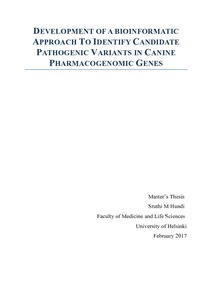Development of a Bioinformatic approach to Identify Candidate Pathogenic Variants in Canine Pharmacogenomic Genes
Hundi, Sruthi (2017)
Hundi, Sruthi
2017
Master's Degree Programme in Bioinformatics
Lääketieteen ja biotieteiden tiedekunta - Faculty of Medicine and Life Sciences
This publication is copyrighted. You may download, display and print it for Your own personal use. Commercial use is prohibited.
Hyväksymispäivämäärä
2017-03-06
Julkaisun pysyvä osoite on
https://urn.fi/URN:NBN:fi:uta-201703141265
https://urn.fi/URN:NBN:fi:uta-201703141265
Tiivistelmä
Genetic variations in pharmacogenomic genes result in diverse response of individuals to different drugs. Understanding the functional implications of these variations has gathered a significant research interest over the past decades providing a prime example for personalized medicine. Personalized medicine is a rapidly evolving field of pharmacogenetics that involves individual design of drug composition and dosage based on the genetic profile. The annotation of the genomes of domestic animals such as dog followed by an increasing amount of available whole genome sequencing data opens new opportunities for pharmacogenomics (PGx) in animal models. Despite some highlighted examples of canine PGx, e.g. MDR1 susceptibility, canine PGx is still poorly characterized.
The major aim of this thesis was to utilize the growing number of WGS (Whole Genome Sequence) data for PGx profiling by developing a bioinformatic analysis pipeline that can identify potential candidate pathogenic variants. Canine orthologs for 540 Human PGx genes were retrieved resulting in 495 canine PGx genes. Ensembl s phylogenetic trees were used to identify the orthologs. The pipeline analysis was piloted in 24 dogs in Border collie. A pipeline was developed to analyze the WGS of these dogs and to identify the pathogenic variants. The analysis altogether revealed 2964 variants in the coding regions of these 495 Canine pharmacogenomic genes. Out of these, 56 variants (1.8%) were predicted to be pathogenic and could be prioritized for further validation to determine their prevalence and functional significance. A pharmacogenomic annotation of these genes was also established, using available human data as a reference model. This annotation categorizes them based on their ortholog relationship, role in drug processing and importance in pharmacogenomics.
The major aim of this thesis was to utilize the growing number of WGS (Whole Genome Sequence) data for PGx profiling by developing a bioinformatic analysis pipeline that can identify potential candidate pathogenic variants. Canine orthologs for 540 Human PGx genes were retrieved resulting in 495 canine PGx genes. Ensembl s phylogenetic trees were used to identify the orthologs. The pipeline analysis was piloted in 24 dogs in Border collie. A pipeline was developed to analyze the WGS of these dogs and to identify the pathogenic variants. The analysis altogether revealed 2964 variants in the coding regions of these 495 Canine pharmacogenomic genes. Out of these, 56 variants (1.8%) were predicted to be pathogenic and could be prioritized for further validation to determine their prevalence and functional significance. A pharmacogenomic annotation of these genes was also established, using available human data as a reference model. This annotation categorizes them based on their ortholog relationship, role in drug processing and importance in pharmacogenomics.
